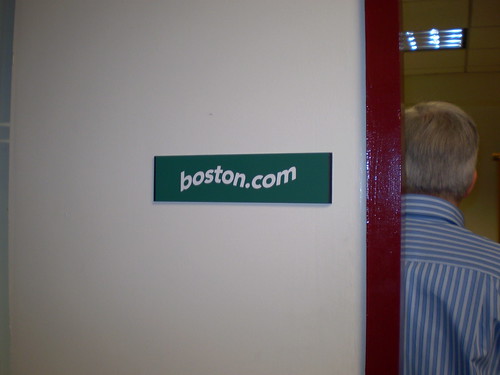 With newspaper companies in danger—The Tribune Corporation is already filing for bankruptcy, and the New York Times Company taking out massive loans to keep itself afloat—many sources of old media are finding it is getting herder and harder to survive. But many journalists are finding new ways to get by, and are looking to the internet as their vehicle to accomplish this.
With newspaper companies in danger—The Tribune Corporation is already filing for bankruptcy, and the New York Times Company taking out massive loans to keep itself afloat—many sources of old media are finding it is getting herder and harder to survive. But many journalists are finding new ways to get by, and are looking to the internet as their vehicle to accomplish this. Take Jon Keller, a political analyst for the local CBS affiliate in
Keller sees his blog not just as an extension of what he does in his television work, but as a separate entity with a whole new—and very different—focus. While his television work is focused at informing viewers, he views the blog as a way to interact with them. ”I think that, definitely, today’s audience is not just going to sit there and be lectured at,” said Keller. “You have to engage them in some way, and that means interactivity.”
Keller is not the only journalist trying to use the internet to help establish themselves. Journalistic blogs pop up all the time, from students jumping in the business, trying to show off their skills - like yours truly - to established journalists using a blog as another platform to do something different then what they do day-to-day. This is what Jay Fitzgerald, a business reporter for the Boston Herald, has done with his blog, Hub Blog.
"I already had the blog going when I joined the Herald," said Fitzgerald, in a conversation we had over the phone. "They [the Herald] were very progressive on blogging, and they let me keep my personal blog." Fitzgerald uses his blog to talk about subjects outside of his everyday reporting, such as politics, which he works on around his day job at the Herald. "I generally post in the mornings, before I go to work...I absolutely don't blog during work," said Fitzgerald. "It is a bit of a balancing act."
Amy Derjue, a former writer for Boston Magazine and Boston Daily, one of the magazine's online sections, has a different reason for keeping her blog - it was how she started writing. In an email interview, Derjue explained, saying, "I started blogging in 2004. I'd graduated from Emerson College, and found a job editing textbooks and wanted to keep writing. " After she began working with Boston Daily, Derjue got introduced to a new way to use online journalism. "Boston Daily was kind of a hodgepodge of work," said Derjue. "We'd follow breaking news, and I'd do interviews or track down my own stories as well. It was reporting meets media criticism meets gossip column."
These are examples of individual journalists adapting to the internet. But how have large news entities, like The Boston Globe, handled the change?. The Globe has had plenty of experience on the internet, as they've been operating on the internet through their homepage, Boston.com, for years. I talked to Mark Micheli, a news editor at Boston.com, about how the Globe has adapted to the internet, at the Globe and Boston.com headquarters in
Micheli also sees opportunity in the website to interact with readers and visitors to the site. “If you look at the newspaper, the newspaper’s kind of flat, it’s stagnant, and it stays the same, because it’s published once a day. With online, you can be more interactive with your audience.” He mentioned an example of how this interactivity has affected their work, citing the bomb scare in Boston a few years ago that turned out just to be an advertising experiment gone wrong, saying “Someone noticed that on our message boards, people were talking about how this was just some sort of marketing prank, and that’s where we first got wind of it.
Not all media organizations believe that their website must be something unique, of course. Robin Lubbock, the director of new media for WBUR radio, in Boston sees the website more as an extended conversation with listeners about the content created by the radio programs. "It's not strictly journalism, it's a conversation. In fact, it isn't journalism at all," said Lubbock. "I think the objective is to create or continue the conversation created by the content."
Lubbock expanded on this, saying that, while they are trying new things on the website, in the end, the content should still be focused on the radio program. "I think we have values [about good content], and we use the same values on the radio as we do on the web," said Lubbock. "Are we trying to make [the website] different? No, we're just trying to make it something the users want to have."
As journalism continues to adapt to the internet, it will continue to be presented with opportunities to grow their communities in ways they might not have thought of before. By using the internet to enhance their traditional work and interact with their audience, they can change the way the present the news to a new—and rapidly growing—community of consumers that follow the news on the internet. Whether they can effectively take hold of this opportunity presented to them will have a great impact on whether these organizations will be able to survive in the new media environment.
No comments:
Post a Comment